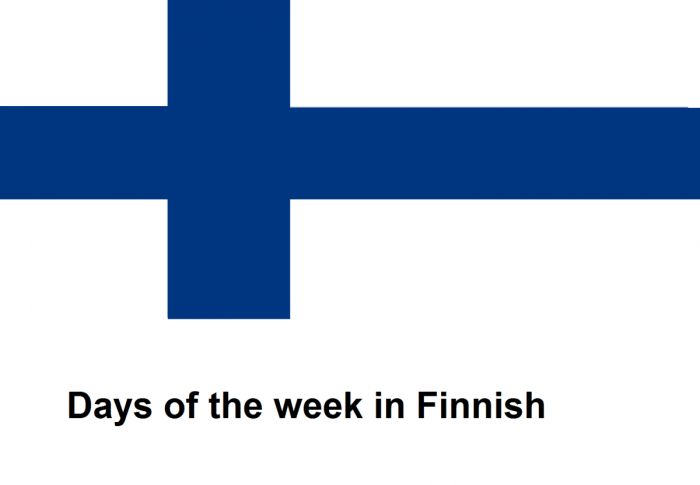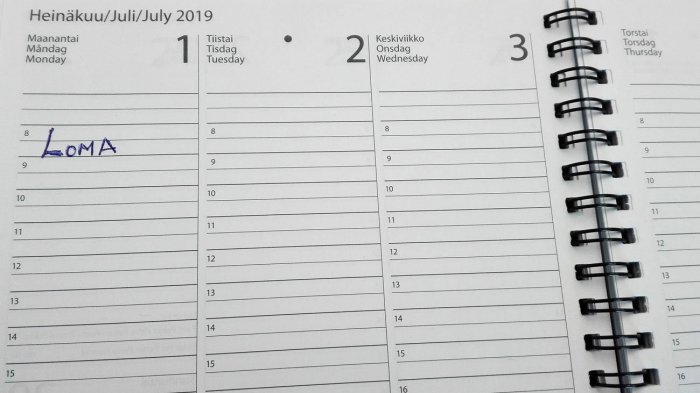Days of the week in finnish – Finnish days of the week, a tapestry woven with linguistic intrigue and cultural nuances, invite us on an exploration that unveils the rich heritage and unique characteristics of the Finnish language and society.
From the origins of each day’s name to their profound associations with Finnish traditions and beliefs, this journey promises to illuminate the fascinating world of Finnish timekeeping.
Introduction
Days of the week play a crucial role in Finnish culture and society, structuring daily routines, social interactions, and even the rhythms of the language. The Finnish language, known as Suomi, is a Uralic language with a rich and unique history, characterized by its vowel harmony, complex consonant clusters, and a system of grammatical cases.
Finnish Language Characteristics, Days of the week in finnish
The Finnish language exhibits several distinctive features that contribute to its unique character. One notable aspect is vowel harmony, a phenomenon where vowels within a word must match in quality (front or back) and rounding (rounded or unrounded). For instance, the word “talo” (house) contains only back vowels, while “tyttö” (girl) features only front vowels.
Another characteristic of Finnish is its extensive use of consonant clusters, often resulting in words with complex pronunciations. For example, the word “rappeutua” (to deteriorate) contains a cluster of three consonants (“ppr”).
Additionally, Finnish employs a system of grammatical cases, with up to 15 different cases for nouns and pronouns. These cases indicate the grammatical function of a word within a sentence, providing flexibility and nuance in expressing relationships between words.
Etymology of Finnish Days of the Week
The Finnish language’s names for the days of the week are derived from various sources, including Germanic and Slavic influences. These names reflect the cultural and linguistic exchanges that have shaped Finnish over time.
Monday: Maanantai
Maanantai, meaning “moon day,” is named after the celestial body. In many cultures, Monday is associated with the moon due to its influence on the tides and lunar cycles.
Tuesday: Tiistai
Tiistai, meaning “fire day,” likely originates from the Norse god Tyr. In Norse mythology, Tyr was associated with war and law, and his name is believed to have been the root of the word “Tuesday” in many Germanic languages.
Wednesday: Keskiviikko
Keskiviikko, literally “middle week,” refers to its position as the middle day of the week. This name highlights the traditional Finnish concept of a five-day week, with Wednesday as its midpoint.
Thursday: Torstai
Torstai, meaning “thunder day,” is named after the Norse god Thor. Thor was associated with thunder and storms, and his name is believed to have influenced the naming of Thursday in many Germanic languages.
Friday: Perjantai
Perjantai, meaning “Venus day,” is named after the Roman goddess Venus. In Roman mythology, Venus was associated with love and beauty, and her name is believed to have been the root of the word “Friday” in many Romance languages.
Saturday: Lauantai
Lauantai, meaning “washing day,” is named after the traditional practice of doing laundry on Saturdays. In many cultures, Saturday was designated as a day for household chores and preparation for the upcoming week.
Sunday: Sunnuntai
Sunnuntai, meaning “sun day,” is named after the celestial body. In many cultures, Sunday is associated with the sun and is often considered a day of rest and worship.
Cultural Significance of Days of the Week

In Finnish culture, each day of the week holds specific traditions, beliefs, and activities that have shaped Finnish folklore, literature, and daily life. These associations have deep roots in Finnish history and mythology, reflecting the close relationship between nature, spirituality, and everyday life.
Monday
Maanantai
Maanantai
Monday is associated with the moon (kuu) and is considered a day of new beginnings and fresh starts. It is believed to be a good day to initiate projects, make important decisions, and embark on new journeys. Traditionally, Monday was a day for women to gather and engage in communal activities such as spinning or weaving.
Tuesday
Tiistai
Tiistai
Tuesday is connected to the planet Mars (tiistähti) and is known as the “day of Tiu,” the god of war and justice in Finnish mythology. It is considered a day of strength, courage, and determination. In the past, Tuesday was often reserved for battles and legal proceedings.
Wednesday
Keskiviikko
Keskiviikko
Wednesday, meaning “middle of the week,” is associated with the god Odin (Odinin päivä) and is considered a day of wisdom, communication, and travel. It is believed to be a good day for learning, writing, and engaging in intellectual pursuits.
Thursday
Torstai
Torstai
Thursday is named after the god Thor (Torin päivä) and is associated with thunder and lightning. It is considered a day of protection, strength, and good fortune. Traditionally, Thursday was a day for feasts and celebrations.
Friday
Perjantai
Perjantai
Friday is associated with the goddess of love and beauty, Freya (Freijan päivä). It is considered a day of joy, relaxation, and social gatherings. In the past, Friday was often a day for weddings and other festive occasions.
Saturday
Mondays through Sundays, the days of the week in Finnish unfold in a steady rhythm. But when it comes to crosswords, the pace can quicken. For a challenge that will test your vocabulary and wits, try the at a frantic pace crossword . Once you’ve navigated its tricky clues, you’ll return to the days of the week in Finnish with a newfound appreciation for their steady cadence.
Lauantai
Saturday, meaning “bathing day,” is associated with cleanliness and purification. It is considered a day for relaxation, leisure, and spending time with family and friends. Traditionally, Saturday was a day for taking a sauna and engaging in other cleansing rituals.
Sunday
Sunnuntai
Sunnuntai
Sunday, meaning “day of the sun,” is associated with rest, reflection, and spirituality. It is considered a holy day in Finnish culture and is often reserved for church services, family gatherings, and quiet contemplation.
Usage and Context: Days Of The Week In Finnish

Days of the week in Finnish play a crucial role in grammar and sentence structure. They are used to indicate the timing of events, plan schedules, and provide temporal context in both spoken and written communication.
In Finnish grammar, days of the week are typically used in the nominative case. However, they can also appear in other cases, depending on the syntactic context.
Examples in Finnish Grammar
- Nominative case: Tänään on tiistai.(Today is Tuesday.)
- Partitive case: Menemme elokuviin keskiviikkona.(We are going to the movies on Wednesday.)
- Genitive case: Maanantaina on pyhäpäivä.(Monday is a holiday.)
Days of the week are also incorporated into common phrases and expressions in Finnish:
Common Phrases and Expressions
- Viikonloppu(weekend)
- Arkipäivä(weekday)
- Viikon alku(beginning of the week)
- Viikon loppu(end of the week)
Comparison to Other Languages

Finnish days of the week exhibit both similarities and differences compared to those in other languages.
One striking similarity is the Germanic origin of many weekday names across various languages. For instance, “maanantai” (Monday) in Finnish shares etymological roots with “Monday” in English, “Montag” in German, and “maandag” in Dutch, all tracing back to the Proto-Germanic term “mānandagas.”
Slavic Influence
Finnish also demonstrates the influence of Slavic languages, particularly in the names for Tuesday and Thursday. “Tiistai” (Tuesday) originates from the Proto-Slavic word “vъtorъnikъ,” meaning “second day,” while “torstai” (Thursday) derives from “čъtvьrtъkъ,” meaning “fourth day.”
Unique Finnish Etymology
However, Finnish also possesses unique etymologies for some weekdays. “Keskiviikko” (Wednesday) literally translates to “middle week,” reflecting its position in the week. Similarly, “perjantai” (Friday) stems from the word “perä,” meaning “end,” indicating its place at the end of the workweek.
Cultural and Historical Influences
These variations in weekday names across languages reflect historical and cultural influences. The Germanic influence on Finnish weekday names is attributed to the Viking Age, when Scandinavian traders and settlers brought their language and customs to Finland. Slavic influence, on the other hand, is a result of Finland’s geographical proximity to Slavic-speaking regions and the subsequent cultural exchange.
Educational Resources

Learning the Finnish days of the week can be a fun and enriching experience. To support your learning journey, here are some valuable resources:
Online Courses
-
-*Udemy
Finnish for Beginners: Learn to Speak Finnish (includes a module on days of the week)
-*Coursera
Finnish Language and Culture: A Beginner’s Guide (covers days of the week in Lesson 2)
-*Duolingo
Finnish language learning app (introduces days of the week in early lessons)
Language Apps
-
-*Babbel
Finnish language learning app (teaches days of the week in beginner lessons)
-*Rosetta Stone
Finnish language learning software (includes interactive exercises on days of the week)
-*Busuu
Finnish language learning app (provides structured lessons covering days of the week)
Textbooks
-
-*Finnish for Dummies by Riitta Kalliokoski (Chapter 2
Days of the Week)
-*Colloquial Finnish by Natasha Suschinsky (Lesson 1
Days of the Week)
-*Teach Yourself Finnish by Olle Kjellin (Chapter 3
Days of the Week)
Benefits of Cultural Context
Incorporating cultural context into language learning enhances your understanding and appreciation of the language. By learning about the Finnish days of the week, you gain insights into the Finnish culture, history, and way of life. This deeper understanding enriches your language learning experience and helps you communicate more effectively in Finnish.
User Queries
How do you say “Sunday” in Finnish?
Sunnuntai
What is the origin of the name “Tiistai” (Tuesday)?
Derived from the Norse god Tyr, associated with war and law
Is there a specific day of the week associated with sauna in Finnish culture?
Yes, Saturday (Lauantai) is traditionally reserved for sauna bathing